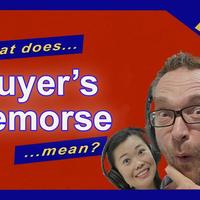What does 'buyer's remorse' mean? - YouTube
Feifei: Hi Neil. Nice shoes!
Neil: Really, Feifei? I'm
not sure about them.
Feifei: They look cool.
Orange is very... original!
Neil: You're just being nice.
I've decided buying orange shoes
was a bad move. I look stupid.
Feifei: Were they expensive?
Neil: Very expensive.
Feifei: You know what? I think you're
suffering from buyer's remorse!
Neil: I suppose I do regret buying them.
Feifei: 'Buyer's remorse' is our phrase
today in The English We Speak.
It's a particular kind or regret
people can feel after a big purchase
like a house or a car. They feel
they've made a bad decision.
Neil: Yes, that sounds right!
Have you ever felt it?
Feifei: Yes, after I bought my new bike.
Thankfully, the feeling passed.
I love my bike now. Listen to
these examples.
A: I made a terrible decision buying this
house. It's in a bad location and it needs
a lot of repairs. What was I thinking?
B: Sounds like buyer's remorse, my friend.
Relax. The repairs aren't serious and it
only takes five minutes to get
to the train station.
A: Lovely new car!
B: Thanks, but I'm feeling terrible buyer's
remorse right now. It was so expensive.
What if I lose my job?
A: Why did I order lobster soup?
Your potato soup was half the price,
and it is tastier.
B: I know the feeling - I always order the
wrong thing then get some serious
buyer's remorse. Let's share.
Feifei: You're listening to The English
We Speak from BBC Learning English.
The expression we're looking at
in this programme is 'buyer's
remorse'. So, Neil. Are you feeling
any better now?
Neil: You know, the funny thing is,
I bought these shoes to cheer myself up!
Feifei: Oh, a bit of retail therapy, was it?
Buying something to make
yourself feel happier.
It doesn't always work!
Neil: Sadly not.
Feifei: Hey, aren't they running shoes?
Neil: Yes.
Feifei: Well how about this for a crazy
idea: go for a run in them!
That will make you feel better.
Neil: You're probably right,
as always, Feifei!
Feifei: And by the way,
I do think they look great.
Orange suits you.
Neil: Oh, thanks. I guess
they are pretty... unique.
Both: Bye.

